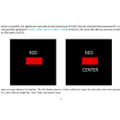Abstract
The present study examined the cognitive locus of Stroop dilution using a psychological re- fractory period (PRP) paradigm. Participants were asked to perform a tone discrimination task via a bimanual keypress response and a modified Stroop task via a vocal response serially as Task 1 and Task 2, respectively. In Task 2, a neutral word was added on half of the trials and no neutral word on the other half of the trials to observe the Stroop dilution effect. The amount of Stroop dilution, as well as the Stroop effect, was relatively constant across different stimulus-onset asynchronies (SOAs), which implies that Stroop dilution occurs due to the competition be- tween a neutral word and a color word after a target color bar is selected to be processed further. These results indicate that focused attention plays an important role in the modulation of Stroop interference by the presence of a neutral word.
